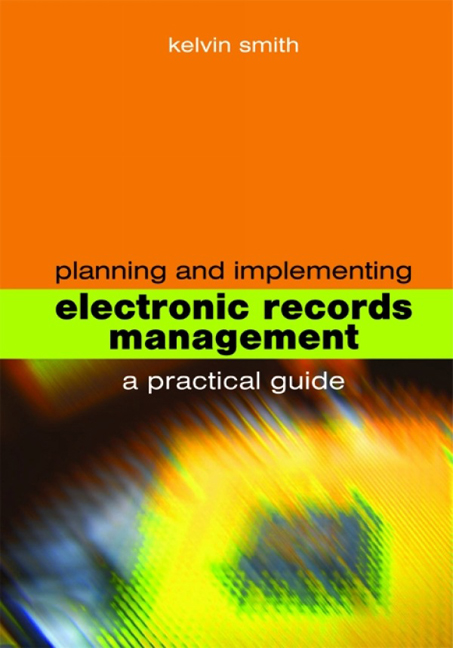7 - Appraisal methodology
from Part 2 - Design
Published online by Cambridge University Press: 08 June 2018
Summary
This chapter examines how appraisal methodologies need to adapt to the evaluation of electronic records. It includes an examination of the role of disposal scheduling, the impact of legislation and destruction of electronic records. At the end of the chapter is a sample table of requirements for retention and disposal.
Before considering appraisal in an electronic environment, we need to be clear about some of the key terms used. Different words and phrases are used by different people in the profession but, for the purposes of this book, the following have been adopted:
• Appraisal – the process of evaluating an organization's activities to determine what records should be kept, and for how long, to meet the needs of the organization, the requirements of government or other accountability, and the expectations of researchers and other users of the records.
• Disposal – the implementation of appraisal and review decisions. These comprise the destruction of records and the transfer of custody of records (including the transfer of selected records to an archival institution). They may also include the movement of records from one system to another (for example, paper to electronic).
• Disposal schedule – a list of collection/series of records for which predetermined periods of retention have been agreed between the business manager and the records manager.
• Retention – the continued storage and maintenance of records for as long as they are required by the creating or holding organization until their disposal.
• Review – the examination of records to determine whether they should be destroyed, retained for a further period, transferred to an archival institution or presented to a third party.
The process of appraisal is important to ensure that the records that should be kept are kept for as long as they are needed – either for finite, identified periods or as archives – and that disposal decisions are properly justified and documented. Appraisal also includes determining what the records are; who creates them and why; how they relate to the creating organization's functions and to other records; and how, when and by whom they were used. All this information is required in order to be able to make a valid judgement on the length of time for which records should be kept. Analysis of the context of a record is a vital part of the overall process of appraisal.
- Type
- Chapter
- Information
- Planning and Implementing Electronic Records ManagementA practical guide, pp. 109 - 128Publisher: FacetPrint publication year: 2007

